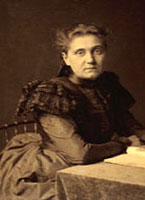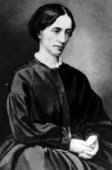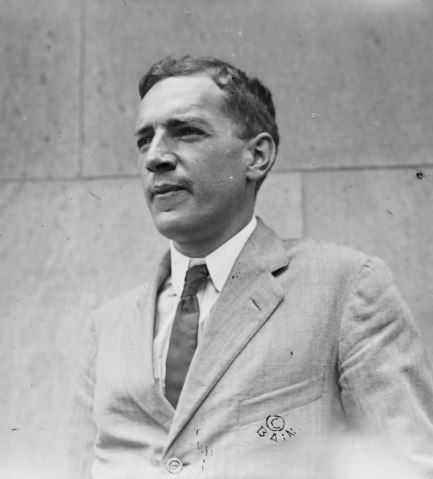
Simone Muench
Born: in Benson, Louisiana
Pen Name: None Connection to Illinois: Muench lives in Chicago. After receiving her Ph.D. from the University of Illinois at Chicago, she began directing the Writing Program at Lewis University where she is Professor of English and teaches creative writing and film studies. She has also served as visiting writer for Northwestern University's MA/MFA in Creative Writing Graduate Program. Biography: Simone Muench received her Ph.D. from the University of Illinois at Chicago and is Professor of English at Lewis University where she teaches creative writing and film studies and serves as chief faculty advisor for Jet Fuel Review. Her chapbook TRACE received the Black River Award (Black Lawrence Press, 2014). She is a recipient of a 2013 NEA fellowship and the 2014 Meier Foundation for the Arts Achievement Award, which recognizes artists for their innovation, achievements and community contributions.
Awards:
- The Air Lost in Breathing Marianne Moore Prize for Poetry
- Lampblack and Ash Kathryn A. Morton Prize for Poetry
Facebook: https://www.facebook.com/simone.muench
Instagram: https://www.instagram.com/simonemuenchie/
LinkedIn: https://www.linkedin.com/in/simone-muench-a6209976
Twitter: https://twitter.com/hb_sundayseries
Web: http://simonemuench.com
Web: https://www.poetryfoundation.org/poets/simone-muench
Wikipedia: https://en.wikipedia.org/wiki/Simone_Muench
Selected Titles
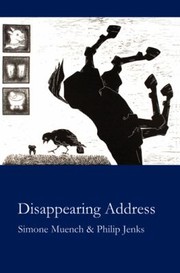 |
Disappearing Address ISBN: 1609640241 OCLC: 729342701 “Dear Leatherface,” “Dear Danger,” “Dear Film Noir,” “Dear Chanteuse of the Abattoir for Young Girls” — if you loved Simone Muench’s Orange Crush as much as I did, you’ll recognize in these titles from Disappearing Address the return of her great animating idea: femininity excited by danger. Muench collaborates with Philip Jenks here to return to the theme in a series of letters to villains from horror films, to abstractions, to icons of pop culture like Morrissey or the high school dance. The exploded syntax of the letters makes for a kaleidoscope of the sublime and the mundane — Coca-Cola, Pop Rocks, and the Day of Judgment jostle one another in a kind of phantasmagoria. There’s wit here — “Dear Nothing” begins “why’d you have to cut out & make everything come back,” “Dear Obtuse” begins “Be straight with me” — but the best of the poems revel in novel images and a diction for which the only possible term is “hothouse gorgeous.” —Robert Archambeau |
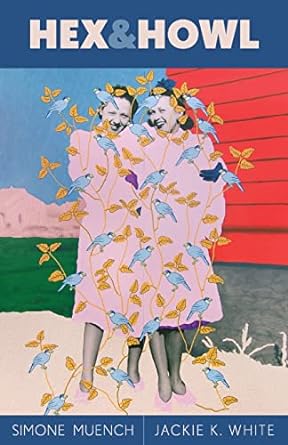 |
Hex & Howl ISBN: 1625570171 OCLC: Black Lawrence Press 2021 Poetry. "You and I were told to swallow / our hexed howling, refuse the reptilian // and the mammalian, unless it's tame, / you know, cow-eyed, with a roundness eager / for petting." A powerful evocation of the feminist voice, HEX & HOWL both applies and upends textuality and tradition, parsing and refuting prior masculinist treatments of women's bodies. The poems in this collection forge multi-vocalities, some exhibiting pleasure in the parameters of the sonnet, others designing new poetic architectures through the double and multiple voicings of centos and self-portraits. "Now we do the refusing; now // we flame in the celluloid dark." HEX & HOWL is collaborative writing at its most innovative, playful, and powerful. Muench and White allow for the creation of a chimeric construction, a third-bodied poem that engages in language-play to explode notions of subjectivity, as the "I" and "you" and "we" shift and shimmer with agency and possibility beyond the page. |
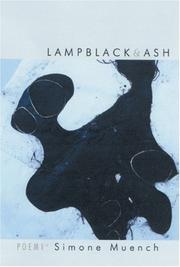 |
Lampblack & Ash: Poems (Kathryn A. Morton Prize in Poetry) ISBN: 193251127X OCLC: 57579469 Sarabande Books, Louisville, Ky. : ©2005. [T]here is something utterly in thrall here, honey-slow and fixated. Driven by obsession—in particular, obsession with the legendary French poet, Robert Desnos—Muench’s identification with a true self beyond the self’s known truth is startling.—from the introduction by Carol Muske-Dukes“Simone’s poems have a confidence and sophistication of what I like to call intentionality. Also wit, grace, poise, and a relationship to writing beyond self-referential feeling.”—Anne Waldman“Lush, sprouting, sensuous images line-by-line, adopting myth freely, Muench’s poems are volatile explosives, circling beauty.”—James Tate |
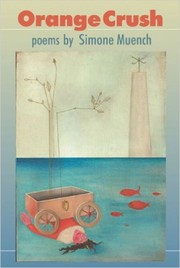 |
Orange Crush: Poems ISBN: 1932511792 OCLC: 318877156 Sarabande Books, Louisville, Ky. : ©2010. "Muench's lush figures give great pleasure to both ear and eye, and her imaginative leaps can feel both mysterious and inevitable, in a way that recalls not only Desnos, but also Neruda."—The New York Times Book Review "Her language is refreshing, musical, attenuated."—Anne Waldman |
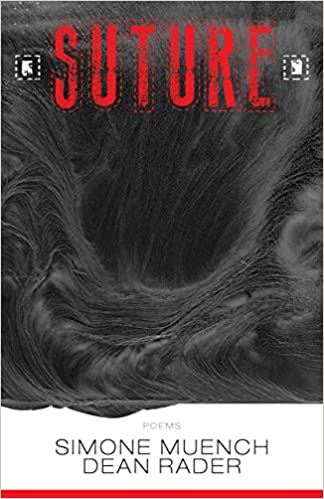 |
Suture ISBN: 162557973X OCLC: 968554797 Poetry. "The endurance of the sonnet sequence over the centuries is in no small measure due to a paradox: it is a form that revels both in its fluidity and in its structural exactitude. The sonnet sequence is also apt to engage us because it is typically an expression of solitary yearning, just like the blues. Petrarch longs for his unattainable Laura; Son House laments his dead beloved. In SUTURE, Simone Muench and Dean Rader turn this latter convention of the sonnet sequence on its head, transforming a mode that seems predicated on an essential loneliness into a collaborative effort, one that is rambunctious, wry, companionable, jittery; and, above all, emotionally capacious. Muench and Rader write with an elegant but mysterious synchronicity—like octet and sextet."—David Wojahn |
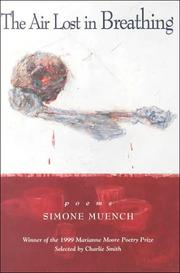 |
The Air Lost in Breathing: Poems ISBN: 1884235301 OCLC: 44516764 Helicon Nine Editions, Kansas City : ©2000. Overall, though, hers is a marvelous collection--and poetry such as this deserves to be read carfully but also heard aloud... (Kansas City Star, Sunday, October 8, 2000 by John Mark Eberhart) |
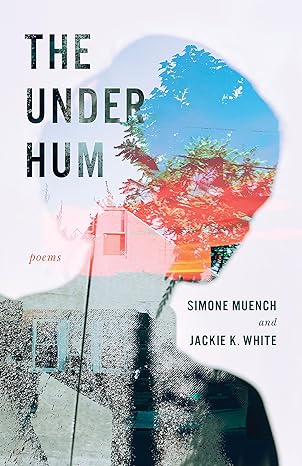 |
The Under Hum ISBN: 1625570708 OCLC: Black Lawrence Press 2024 "What happens when two women write self-portraits 'lined' by famous writers? The answer lies in the collaborative magic of Simone Muench and Jackie K. White's THE UNDER HUM, a gorgeous panoply of golden shovels, centos, and tangy tercets to make you love poetry again as a celebration of the thrills and surprises of language. 'We are a strange syntax that cannot be mapped,' say the poets. And we were happy getting lost in their 'Portrait as Landscape' sonnets, the sublime terrain constantly shifting and blooming with music metaphor, 'with mirrors and seasons…stuck between no way and anyhow,' reminding us in the best possible way that 'everything human is made up' and, in THE UNDER HUM, we get to take pleasure in the result."--Denise Duhamel & Maureen Seaton "Collaboration means creation. These poems expand from that natural cycle of visionary poetry, that invites more than one poet to get involved with the poems, until language itself becomes a complete process of imagination and meaning. The result is a book that shares a complex world with the reader and proves that true poetry does not leave anyone alone."--Ray Gonzalez "THE UNDER HUM is a spectacle of poetic collaboration. From the poets Simone Muench and Jackie K. White comes a collaborative collection of poems in various poetic forms from perspectives and lines from a wide range of authorial references. The book is almost operatic in its show of virtuosities both present and historic. . . This book delivers!"--Ed Roberson Poetry. Women's Studies. |
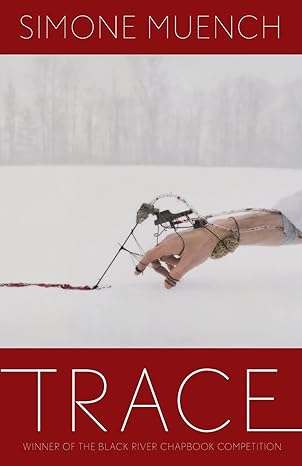 |
Trace ISBN: 1625579918 OCLC: Black Lawrence Press 2014 Poetry. Through these 26 haunting poems, which draw from sources ranging from Dante to Baudelaire to Berryman to Millay, Simone Muench reimagines the figure of the wolf and the cento form by interrogating the possibilities, limits, and interplay of language, the human animal, and the hungry landscapes of relationship and poetic homage. Muench's speakers confront their own darkness and mortality through flickers of wilderness and heat: "Tonight, the wolf is a solitary shadow / that spills between stone & revery / as bodies resume their boundaries. / ... / Facedown, I lick away the footprints." Through evocations of the animate self—wolf and human—Muench's traces leave behind a living heart, a mark in the snow. Lyrical, elliptical, and intertextual, TRACE looks fiercely into the animal dark to reveal "a vaulting sunrise, hissing salt." |
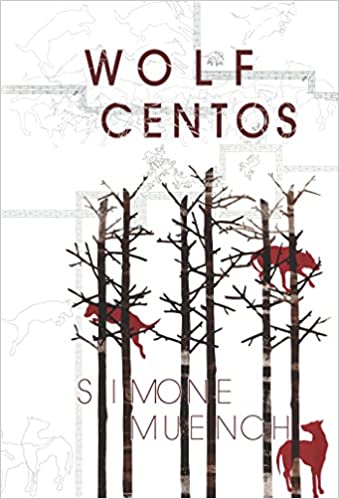 |
Wolf Centos ISBN: 1936747790 OCLC: 859046598 Wolf Centos is comprised of centos, a patchwork form that originated around the 4th century. The form is one which re-configures pre-existing poetic texts into new systems of imagery and ideas. The author is able to place poets in conversation with one another across centuries and across continents. Though the poems are explicitly sutured together by the motif of the wolf, they are also linked by other elements, particularly motifs of language, loss, desire, and transformation. Wolf Centos is ultimately elegiac as it oscillates between transformation and stasis, wildness and domesticity, death and beauty, damage and healing, because ultimately our lives constantly shift between these polarities as well. The ultimate knowledge of the poems is that as we age and experience loss, we must retain our wildness”the wolf’s wildernessinside us. In this way, the wolf becomes a symbol of a threshold, a transformative space. |


